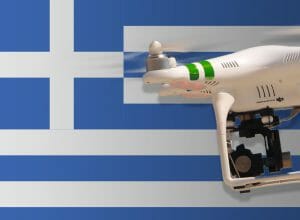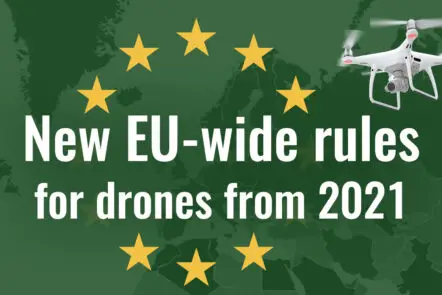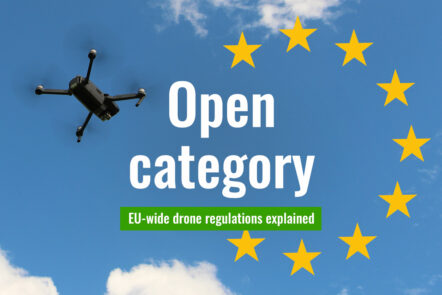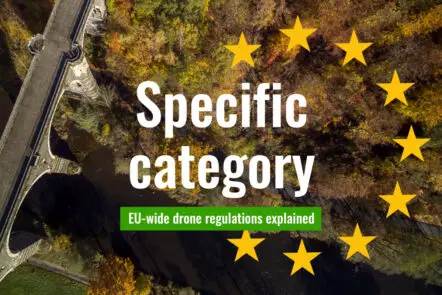Drone regulations in Greece
Last update on 29.08.2023 | 53 Kommentare

In this article, you will learn what you need to know as a drone pilot in Greece.
The EU Drone Regulation has been in force in Greece since December 31, 2020. This has largely harmonized the rules for remote pilots. You only have to register as an operator in one European country and your EU drone license is also recognized across countries.
If you want to register in Greece, you can do so via this link.
Overview of the European rules that apply in Greece
In Greece, the regulations of the European Aviation Safety Agency (EASA) apply. The following is a summary of the key facts. For a complete overview, read our article on the new EU drone regulation.
National peculiarities in Greece
Each country can define certain aspects of its drone regulations. For Greece, the following requirements apply in addition to the European regulations.
Further requirements in Greece
You have to have insurance for your drone in Greece if you use it for business purposes and also for personal purposes if it weighs 4 kg or more. You will find liability insurances that are also valid in Greece here. If possible, you should also take a translated version of the proof of insurance with you to Greece. This can considerably simplify entry or an inspection.
Although EU rules apply in many countries, sometimes there are additional requirements you must meet. For example, in Greece, you have to apply for a permit if you want to use the airspace. This document details the application process if you are a Non-EU or a EU Resident.
You must fill out this form if all of the following 4 conditions apply:
- You do not have a Greek tax number, i.e. you are in Greece as a visitor.
- You plan to fly your drone in a free flight zone. Free flight zones are completely unrestricted areas, i.e. free from civil, military, security, archaeological and other restrictions. You can view these through the DRONE AWARE GR application.
Note: HCAA does not approve flight requests in restricted areas. - The purpose of your flight is for recreational purposes, such as sightseeing or personal photography/videography, and is not for profit.
Y - ou want to fly higher than 160 feet AGL (above ground level) or more than 50 meters away from you.
Note: If you only want to fly your drone a maximum of 50 feet in any direction, you do not need a permit!
If you meet all the requirements, fill out the form and send it to [email protected] and [email protected]. You will usually receive a response with the permit within a short time.
Safety distances and flight bans
A distance of 8 kilometers must be maintained from airports. This means that you are not allowed to fly on almost any Greek island that has an airport, because many islands are quite small. Exceptions are possible with the written permission of the Greek aviation authority.
Flight bans apply over military installations, hospitals, prisons, and other government facilities. Furthermore, you are not allowed to operate a drone over people, populated areas, parking lots, and roads. No-fly zones can be determined with the free application Drone Aware – GR.
The owners of land (this also applies to hotels) must agree to a take-off on their property. Personal rights must be respected. Flights in nature reserves are only possible with prior permission. For flights over archaeological sites and archaeological sites, permission must be obtained from the Ministry of Culture. Please note that the Greeks are very strict here!
Good to know
You should definitely follow Greek regulations. In almost every city or area in Greece, there is said to be a police squadron of trained birds of prey who are specialized in bringing drones down from the sky. Apparently, this is supposed to be a counter-terrorism operation, but you never know.
We have researched the listed drone regulations for Greece to the best of our knowledge. We can not guarantee the correctness of the information. If you want to be on the safe side, please contact the competent aviation authority. Alternatively, you can also ask the embassy in your country for further information about the regulations. Please leave us a comment when you receive news and/or gain experience with your copter in Greece!
 EU-wide drone regulations: Classes of drones explained
EU-wide drone regulations: Classes of drones explained
 New EU-wide rules for drones from 2021
New EU-wide rules for drones from 2021
 EU-wide drone regulations: The Open category explained
EU-wide drone regulations: The Open category explained
 EU-wide drone regulations: The Specific category explained
EU-wide drone regulations: The Specific category explained
Hi. If I have a DJI Mavic mini fly more drone, do I need to be registered in Greece and do I need flight permits? Thanks.
Did anyone in Greece have a problem with the police because of drone flying? Because it is certainly complicated to get a permit, and you have to inform the police about the flight plan. Would I be able to pass without problems if I flew with the Mini 2 and if I did not endanger anyone?
I have been registered in a EU country and fly my mini 2 all over Europe, stick to the drone code and you’ll be fine … hopefully
I have seen a couple of drones around the Acropolis
Hi Alan,
We don’t know the details of what you are describing. But we hope that most drone pilots are responsible enough to not fly above such historic sites unless they have permission. Black sheep ruin the experience for all of us and give drone pilots a bad reputation. In the worst case, they are the reason for stricter drone laws.
I understand that an operator Id is compulsory but I’m still not clear on requirements around a remote pilot id and flight permissions around Greece. I’m visiting Greece this summer and I have a DJI mini pro 3 so it’s sub 250g – do I require permission for every individual flight and do I need a remote pilot is too (how do I get one of these for Greece)?
I am in the same situation and after many emails etc I have kind of figured out what is needed, firstly “you must register yourself with the National Aviation Authority (NAA) of the EASA Member State you reside in” or if you are like me who happens to live in the United Kingdom then you need to register with the National Aviation Authority of the first EASA Member State, the authorities in Greece have said that “Unfortunately due to reconstruction of the webpage of the Hellenic Civil Aviation Authority, currently, access to the registration platform is limited to citizens of Greece (Tax number is required)” and they advised me to register at another EASA Member State which will allow me to get a registration number which I can put on my drone and use in all EASA Member States. In the following website you can find all EASA Member States where you can register and the links to the websites of each one: https://www.easa.europa.eu/domains/civil-drones/naa . I found Croatia the easiest as it had an English version of the site and was straight forward. After you get registered and successful put the registration number on your drone you then must contact HCCA (aviation authority in Greece) via this email: [email protected] , they will send you a form to fill out which you need to fill in and send back. From what I understand you must fill in this form and send it over for them to approve your flight everytime you want to fly your drone in Greece, from what I have read they take about 48 hours to respond with a decision. You may also find the following video useful on how to fill in the form: https://www.youtube.com/watch?v=8NkRZpckOg8&ab_channel=OffbeatTravelVK . Also from an email correspondence I received from the HCCA it said ” if UAS is heavier than 249 gr they need to pass the on line test to obtain EU Remote Pilot Certificate. ” its a bit confusing when you see the tick box in the form for Remote Pilot Certificate but you only need this if your drone is more than 249 grams. For future reference if you do intend to use a drone over 249g then you can use the following link to take the course for Remote Pilot Certificate: https://learningzone.eurocontrol.int/ilp/pages/description.jsf#/users/@self/catalogues/8264768/courses/11790650/description .
I hope all this information was helpful as I found it hard to figure out what was needed too.
I am also using the same drone 🙂